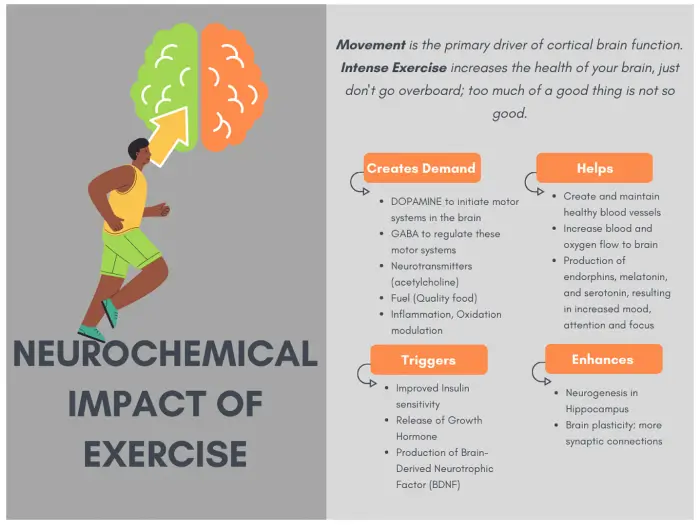
In order to promote the benefits of exercise, the intensity should reach 70%-85% of your Maximum Heart Rate. In general terms, you calculate this approximation with the formula (220 – your age). This would give you the range of effort.
Remember that as you become more “fit,” this rate of effort will vary, so you will need to “work harder” to reach these exertion thresholds.
Moreover, you need only a few minutes of elevated exertion to achieve results and obtain neurological benefits. A combination of strength and cardiovascular training is the best approach.
High-intensity exercise produces inflammation and oxidation. You need to maintain a level of work (your Metabolic Tipping Point), so your body adapts and is able to recover and detoxify. When you overdo it constantly, instead of benefits, you will actually cause unwanted damage in recovery and progress.
Rest and recovery are as important as the exercise itself.
Nutrition that supports your brain:
In general, a diet that controls your glycemic load will go far:
A well-formulated and executed Paleo Style of Diet
Targeted and controlled carbohydrate intake around workouts to replenish glycogen stores
A ketogenic style diet is great for achieving keto-adapted (use of fat as energy substrate) that better support brain function and expedite recovery from exercise.
1gr of protein per Lean Body Mass
75gr of no starchy carbohydrates
Healthy fats to complete your caloric needs: Avocado, nuts, Olive oil, and Coconut oil.
Control of Inflammation and oxidation:
Glutathione
Alpha-Lipoic Acid
PQQ
Mitochondria Protection
Improves ATP synthesis
Improved neuronal metabolism
Herbs that support BDNF:
Curcumin, Resveratrol
Berberine
Green Tea
Gingko Biloba
Lemon Balm
Feverfew
Remember: Consult your care team before engaging in new exercise routines and/or changes in dietary and supplementation.



